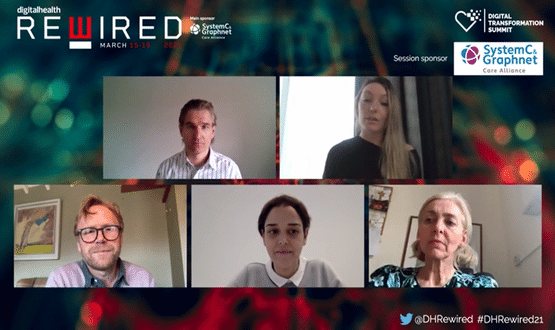Rewired 2021: AI ‘as critical to organisations as electricity’
- 18 March 2021

Artificial intelligence and data-driven solutions will be as “critical to organisations as electricity”, a global lead in the technology has said.
During his keynote at Digital Health Rewired 2021, Dr Christian Guttmann, global head of AI and data at TietoEVRY, said health and care leaders need to become more aware of the technology to better equip their organisations for the future.
Speaking as part of the ‘digitising medicine’ track, Dr Guttmann said AI will be the most disruptive technology of the next decade.
“Artificial intelligence is the most disruptive technology by far for the next 10 or 20 years, no other technology will influence the way we live, the industries and particularly health and medicine more than AI,” he said.
“This is a technology that is as important and as critical to your organisation as electricity is.”
He added the role of the digital health leader is becoming “increasingly important” as we move from basic technologies to more complex technologies being introduced.
“It is even more challenging because you will start having data-driven approaches, you will have AI performing tasks that were usually entirely reserved for human experts,” he said.
“So it becomes increasingly important for leaders of authorities, of clinics, politicians and regulators to get their heads around this topic.”
Dr Guttman, who is also a senior research fellow at the Karolinska Institute and executive director of the Nordic AI Institute, encouraged leaders to bring their staff along on the journey.
“When you have initiatives happening in your organisation, whether you’re a health authority or a hospital, there will be many employees who have many great ideas,” he added.
“As people become more digital, they understand how AI can be used… you as a leader have to encourage and cherish these types of new ideas and they need to go all the way up to the highest possible level of the organisation.”
Having conversations with staff will lead to better ways of working, better use of technology and ultimately better workflows, he said.
Using AI to disrupt medicine
One example of a company that aims to use data-driven technology to disrupt medicine is Proximie.
Rewired attendees heard from Dr Nadine Hachach-Haram, founder of Proximie and innovation lead at Guy’s and St Thomas’ Hospital. She said Proximie is a software solution that “enables clinicians to virtually scrub in to any operating theatre anywhere in the world”.
Dr Hachach-Haram said that while medicine had made significant advances the way surgery is performed “didn’t adapt it to this new, fourth technological revolution”.
There’s an idea that we all need to be together in an operating room that’s “undigitised, not data-driven, it’s not capturing any information apart from those who are observing” she explained.
Proximie allows surgeons to share knowledge and surgical skills virtually through the power of technology.
“I started to imagine a world where we could digitise the operating room. Imagine we could create a network of operating rooms connected to high quality communication platforms, immersive by layering augmented reality, to allow us to really do what surgeons love to do…show how to move through the steps of an operation,” she said.
“Imagine the system could also capture information and knowledge that could help empower us for the next operation and the one after that.
“But today the methodology that we use is very analogue, it’s very siloed and disconnected.
“If we could see a single platform that could allow us to do all of this, and look at our knowledge, imagine what an operating room that would be.”
Collaboration and accessibility
Dr Guttmann and Dr Hachach-Haram were joined by Professor Henrietta Bowden-Jones OBE, consultant psychiatrist and honorary professor, and Dr Katerina Spranger, chief executive of Oxford Heartbeat.
Dr Spranger spoke of the need for need for collaboration between engineers and clinicians to ensure products are co-designed.
Oxford Heartbeat using AI to help plan neurovascular surgeries involving stents, typically used to reduce the risk of a heart attack.
“It is absolutely vital to co-innovate with clinicians, no matter how difficult it is, to ensure future success and adoption of the product,” she said.
Professor Bowden-Jones spoke of the unforeseen silver lining of the Covid-19 lockdown – gambling and addiction services going virtual.
She said accessibility of services for gambling and gaming disorder “have always been an issue”, often because of stigma.
“This has allowed people to receive treatment from the comfort of their home,” she said.
“There’s better access nationally, lower rates of DNA (did not attend) and online workshops are highly attended.”
The keynote speakers recently took part in an episode of Digital Health Unplugged. You can listen to the chat about digitising medicine here.
Digital Health Rewired 2021 is running from 15-19 March and is free for everyone from NHS, public sector, independent providers, charities and education sectors, plus start-ups less than three-years old.




